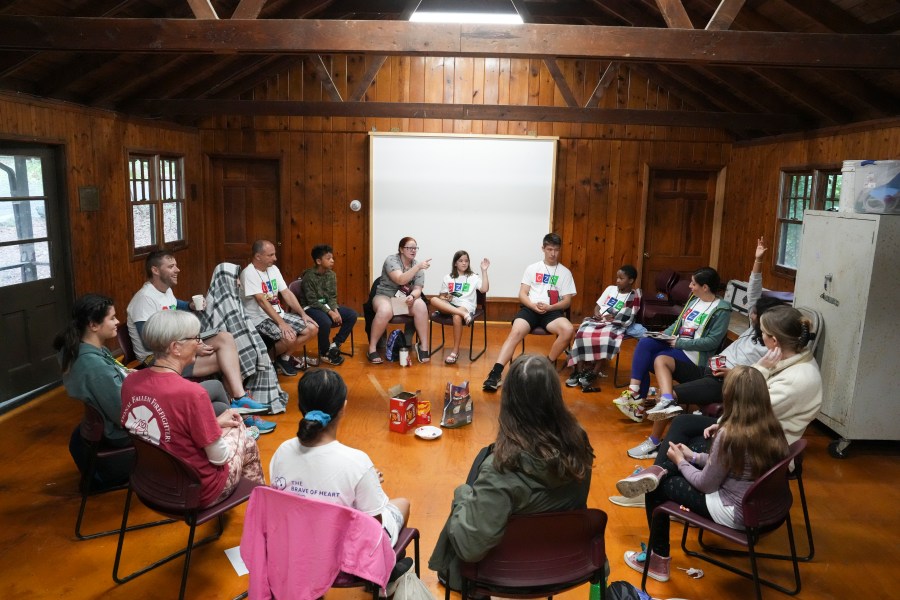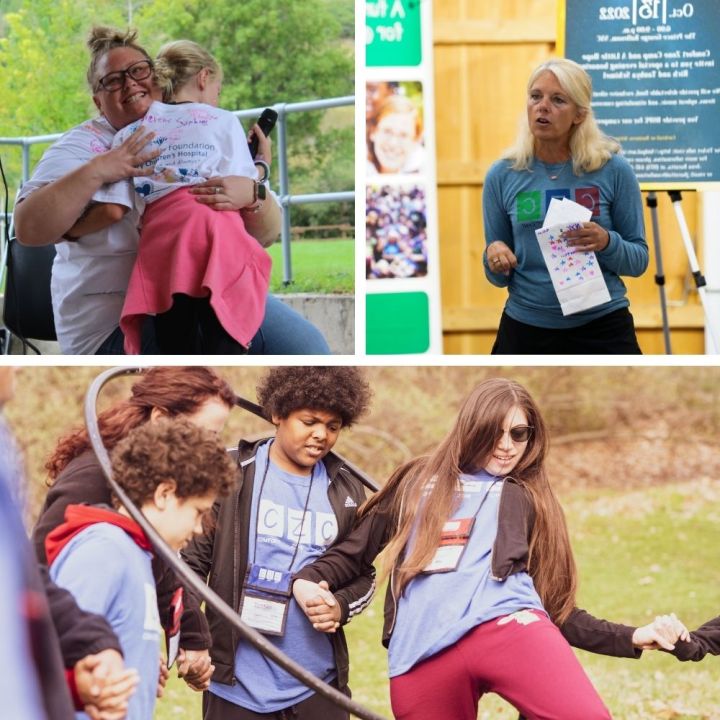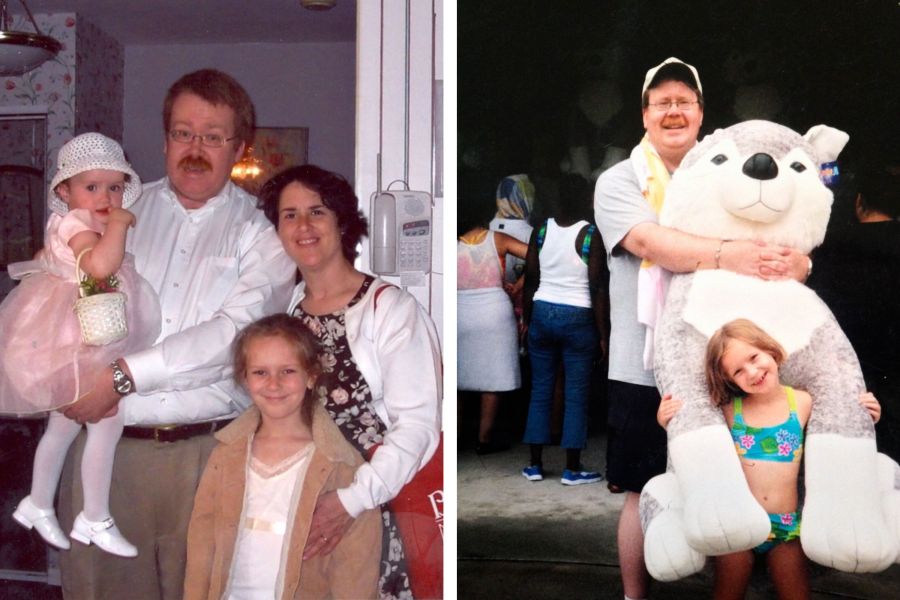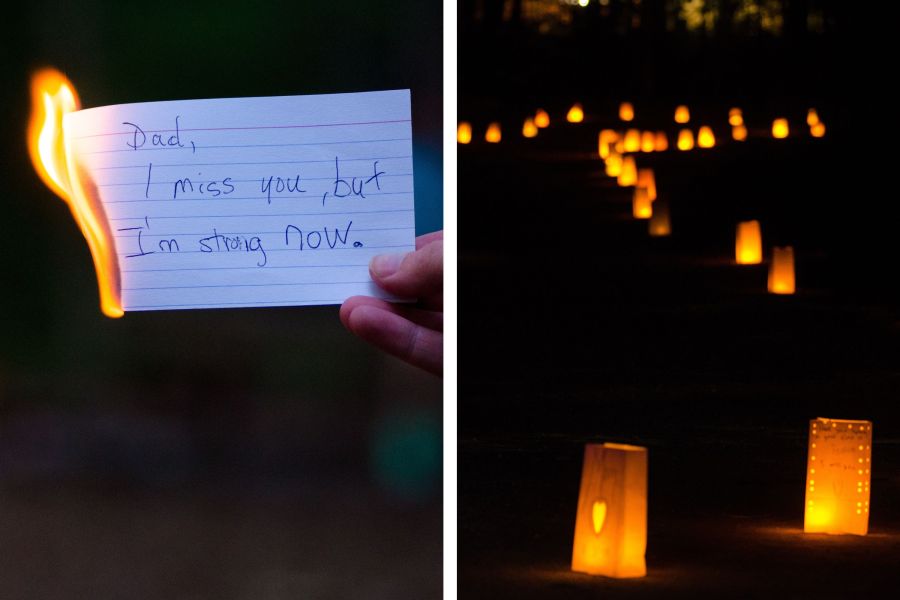‘This is a fun place’: Camp for suicide loss helps kids heal
- Enrollment in suicide-loss camp almost doubled in the past year
- Format at camp mirrors that kids grieve differently compared to adults
- Returning campers give hope to those with more raw loss

Volunteers and kids play at Comfort Zone Camp, a free camp for kids who have experienced loss. Courtesy of Comfort Zone Camp.
Correction: A previous version used the wrong acronym for Comfort Zone Camp (CZC).
(NewsNation) — Friday nights at Comfort Zone Camp in New Jersey are the best kind of pandemonium — kids playing pickup basketball or gaga ball, friends catching up over the craft table, campers picking which bunk they want, and parents and volunteers reassuring nervous newcomers.
Yet these kids are all there for one reason: They’ve all lost someone. In particular, someone close to them died by suicide.
“Every single person (here) is going to get it,” volunteer and former camper Sarah Ash said. “There’s no judgment. (Kids) really just feel safe.”
If you or someone you know needs help, resources or someone to talk to, you can find it at the National Suicide Prevention Lifeline website or by calling 1-800-273-8255. People are available to talk to 24/7.
For more than two decades, Comfort Zone Camp has helped tens of thousands of grieving kids and their families all over the U.S. Yet camp leaders began noticing a rise in the number of kids surviving suicide loss and created a 3-day weekend specific to their unique needs.
The issue has only gotten worse: In fact, enrollment in their suicide-loss-specific camp grew by almost 50% between last year and this year.
And it is so important to be around people “who get it,” said Lynne Hughes, who founded CZC in 1999, after losing both her parents as a child. The place where she found the most healing was camp.

“In the real world, everybody gets shocked and pulls back, their own mortality will start spinning when they find out you lost your parents, and you’re comforting them, making sure they’re OK with your loss,” she said. “(Camp) was a magical bubble where time stands still. And you can step outside of your loss and get back to being a kid again.”
During the free 3-day weekend, each child is paired with a big buddy, an adult who acts as a friend, encourager and listener. Many of these volunteers were once campers themselves.
CZC’s environment can be powerful in jumpstarting healing, Hughes says, because it follows the way kids grieve — which is different from adults.
“Kids grieve in short bursts,” she said, adding they alternate between fun and silly activities and intentional time to work on grief. “Their biggest fear is, ‘How heavy is this going to be? Is this going to be like, death camp?’ We want to dispel the myth right away. This is a fun place.”

‘Not alone’
Ash came to CZC as a 13-year-old who had lost her dad to suicide only months before. She was nervous and upset at the thought of her mom leaving and refused to get out of the car when they arrived. That was, until a volunteer came to talk to Ash.
“I don’t even know what she did, but she got me out of the car,” Ash said. “And my life has been changed ever since then.”
Ash is one of dozens of former campers who return to volunteer for the suicide loss camp. She says the role is simple: Kids need to know that they’re not alone.
Before camp, “I was playing the part of a grieving kid,” Ash said. “It wasn’t until I was at camp and could kind of just take a breath and be like, ‘OK, this is my only job this weekend, I don’t need to take care of my sister. I don’t need to take care of my mom.’ … And I shared my story for the first time at camp.”

She says going to camp has given her a place to remember the generous, fun-loving dad who volunteered at her school and cared about her friends’ lives. She also credits camp with her decision to become a therapist.
Suicide loss differs from other types, as the grieving process is complicated by the stigma, guilt, responsibility and shame the survivors often feel. Because of that, the camp offers separate programs for children and their parents, allowing each to work through their own complex emotions without worrying about burdening their other family members.
CZC’s official parenting camp began in 2020 when the camp briefly moved online. Yet parents said the unofficial community that had been around for years was just as meaningful for them — allowing the entire family to heal.
Ash’s mom Louise says she keeps in touch with other parents through Facebook.
“We’re 12 years out of our loss and (people) don’t really get that we’re still grieving,” she said. “When my (younger) daughter was going to graduate from high school and her dad wasn’t going to be there, I just sent a message … and a gazillion messages came back.”
“By helping the parents heal during the weekend, the kids are coming home with an even greater chance of continuing their healing,” Louise said.

The camp also staffs therapists who lead small groups where kids can share their stories and learn coping skills to use outside of camp. Because kids come back year after year, the more veteran kids can give hope to those with more raw loss.
“These kids come in almost carrying like a backpack full of rocks, and I swear, it gets dumped out. You see them lighter and brighter when they tell their story or they cry and the world doesn’t end,” Hughes said.
But perhaps the most powerful moment of the whole weekend is the memorial service, designed and led by the kids.
“Adults tend to be the ones who plan funerals, so they’re not super kid-friendly,” Hughes said. “Sometimes they’re telling dad’s favorite jokes, and … mom’s in the audience going, ‘No! Cut!’”
“It goes back and forth from the belly laughs to crying to the belly laughs,” she continued. “It’s just got that right tempo, and it allows the kids to blossom and grow and heal right in front of our eyes.”









